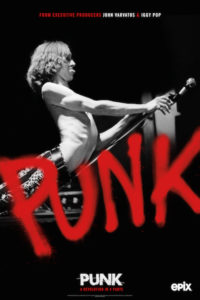
Punk, a documentary about “the music, the fashion, the art, and the DIY attitude of a subculture of self-described misfits and outcasts” is set to debut March 11, 2019 on the Epix network. Directed by Jesse James Miller, the film is executive produced by rock legend Iggy Pop, fashion icon John Varvatos, and Network Entertainment CEO Derik Murray.
The whole affair kicked off as messily and combative as you’d assume a “punk event” would implode, with a March 4 press conference at SIR Studio in West Hollywood where John Lydon spewed venom all over fellow panelists Marky Ramone and Henry Rollins. Or was it simply theater? Click this link to read the RollingStone.com report and see the video.
Whether Punk is truly entertaining, informative, and/or revelatory is yet to be seen, but I was lucky enough to interview some of the punk musicians slated to be covered in the documentary. I am happy to report that all of these punk artists I talked to over the years were polite, engaged, and very willing to discuss their craft. Not one of them ate me alive.
I thought I’d share some of the words they shared with me on the eve of the Punk debut.
Iggy Pop
Guitar Player, 2006—”There’s usually something about the energy in a guitarist’s hands that makes the guitar sound a certain way. For example, no one I’ve ever encountered in the world plays as loud as [former Sex Pistol] Steve Jones. He’ll dwarf anyone—even if they have twice the equipment. He just has these enormous boxer’s hands with a lot of power in them. Ron Asheton of the Stooges, however, has these long beautiful hands that look like they belong to a painter. He can get rough, but there’s a refined edge to his playing. It’s not exactly bar music. There’s more lyricism there.”
“There are a lot of little garage-y bands that are trying to be unique and menacing, but the two things usually don’t come together. One problem is that the recording industry has become so sophisticated—in terms of collecting and distributing the money and studying the market—that there are great fortunes to be made very quickly from pushing the widgets. And it’s for everybody—the lawyers, the stockholders, and right down to the poor sap who manages to write something good on his guitar. It’s a more calculating time, and the people who seem to be doing the best are the ones who take an old Sting song, dust off the chorus, sample it, and get some thug who wants to clean up his drug money. It’s understandable, because it’s really hard to play music—especially loud guitar-based music—in a major U.S. city unless you have a lot of money behind you. When I was coming up in Detroit, all I had to do was work a few months as a waiter—while Ron and his brother worked in a head shop—and we collected enough money to get a little house together. You could buy a cheap guitar amp, make some noise, and get on stage with a minimal investment. Now, everything costs more, and it’s hard to get around. And then there are all the new gadgets that make it real easy to make music, and real easy to steal stuff. But, to me, actual craftsmanship has a terrific reward, and that’s what I hope will have a lasting value within our society.”
Johnny Ramone
Guitar Player, 2003—”Somehow we were different—we appealed to all the misfits of society—and it seems we were an influence on a lot of bands. A lot of kids went and got guitars—even bands that don’t sound anything like us—and they went to see the Ramones, and they started playing because of that. I see it more in retirement than I did when I was doing it. But when you get a chance to sit back, and you have everyone say nice things about you, it’s great. A band could put out a record, sell ten-million copies, and never influence anyone. We didn’t sell a lot of records, but, somehow, we left an impression.”
“I once had a discussion with [Metallica guitarist] Kirk Hammett, and he felt like I invented downstrokes [on the guitar strings]. It was just a timing mechanism for me. I bought the guitar, and I didn’t know how to play, and I didn’t figure out other people’s songs. I just got the guitar and said, ‘Here’s the A chord, let me do four beats on it.’ It just kind of fell in naturally. At the time, I didn’t think about it. But I did see Green Day a while back and they were playing a Ramones song, but they were up-and-downing it, and it didn’t sound the same. I feel that people try to downstroke and find it difficult. It always came natural to me, because that’s the way I started off doing it. Going back, I noticed how [Led Zeppelin’s] “Communication Breakdown” had a drive to it, and I liked Jimmy Page. I don’t think he did downstrokes on that song, but it sounded like it—the feel, the energy, the way it drove. The way I approached it at that point was, ‘I’m cool. This is it. This is what you’re getting. I’m not worried about what anyone else is doing.’ I just didn’t give a shit. It became an art of how little effort I could put into everything. I couldn’t compete with the players that had come prior to me, because it would have taken too much time. I was 25-years old when I bought my guitar. No way was I going to sit there and try to learn Jeff Beck, or Jimmy Page, or any of those people. It was already too late for that, so I couldn’t worry about it. I just had to worry about, ‘This is what I do. This is my style. Take it or leave it!'”
Donita Sparks
Guitar Player, 1999—”Our basic trip is distortion, but we always feel free to throw in something fresh, strange, or goofy. We’re not the best players in the world, but we go for the soul. It’s all about the songs and spirit, rather than technical expertise. I mean, a lot of talented guitarists just don’t rock me. And while I respect bands that can play, there’s also something to be said for bands like us, who rock as a unit. There may not be an amazing player in the lineup, but the band is a contender!”
Steve Jones
Guitar Player, 2016—”I liked Mick Ronson and Ronnie Wood as guitarists—especially their leads—because they were something to grasp onto. It wasn’t too fast and fancy and twiddly twiddly. It was just tasty. They were very catchy whenever they did leads. Like, Ronnie’s solo on “Maggie May” was all very tasty, catchy stuff with catchy notes. That’s what I’m interested in. I’m not interested in runs 100 miles an hour. I could never do that, anyway. Even if I practiced for a thousand years, I’d never be one of those guys. I just don’t have it in me for my brain to do that. I don’t know how these Yngwie Malmsteen blokes do it, to be honest with you. They’re good at what they do, but it does nothing for my brain at all.”
John Lydon
Guitar Player, 2016—”When recording a song, it’s always better to get it right live with everything playing at once because you get the drama—the humanity. If things slightly slip out of phase with each other, it can create a beautiful drifting in the mind. Oh, it’s borderline chaos at any moment, but that’s where the best stuff comes from. It’s learning where to have restraint, and where to set control aside. It’s accepting negativity and looking for honesty in each other. Tensions are worthy of exploration and they can be riveting. You see, it has taken me 40 years to get to this point, and it has been 40 years well spent. I’ve learned not to be shy about myself, and I was fortunate enough when I first began to be instantly disliked by everybody. And now, the longer I’m around, the more I learn, and the more I’ve got to give. It’s as simple as that. A song can never be 100 percent accurate in terms of human emotions, but I try for a good artistic rendering. I just let my heart and soul tell me what is the right thing to do.”
Chris Stein
Guitar Player, 1998—“I don’t get tired of playing Blondie’s hits—mostly because the parts I play onstage now are way different from what I played on the original tracks. Many of those parts were ‘studio constructed,’ and they had nothing to do with the band playing together live.”
Sylvain Sylvain
Guitar Player, 2009—”When you perform live, you’ve just got to go. You’ve got to have your team together. Everybody has to be able to put their heart and soul into it, and work for the song, and that’s the end of that. With the New York Dolls back in the day, if you took away the lipstick, you got the blues, three chords, and maybe some improvised solos. It never got boring, it never gets boring. We could probably play the same thing for another 300 years, and we would find it really interesting, because that’s the way it is with us. If the audience is dancing, we keep it going. If they’re not, we’ll get the hell out of there!”
John Doe
Guitar Player, 2004—”The early punk scene in Los Angeles was extremely cooperative, because everybody had to pull together to keep this very tenuous sort of wobbly, shaky thing moving. Everybody worked together, and, at the same time, nobody wanted to sound like each other. The Germs and X played a lot together, but we didn’t sound alike. Neither did the Plugs, the Alley Cats, the Weirdos, or the Screamers. I would say it was the same in the San Francisco Bay Area. The Avengers and the Dils were very different, and so was Crime, the Nuns, and the Offs. Everybody seemed to have their own sound, like in New York with Blondie, or the Talking Heads, or the Ramones, Television—people like that. I don’t think it was until further on in the 1980s, when the music became a kind of codified into ‘This is what punk rock sounds like!'”




